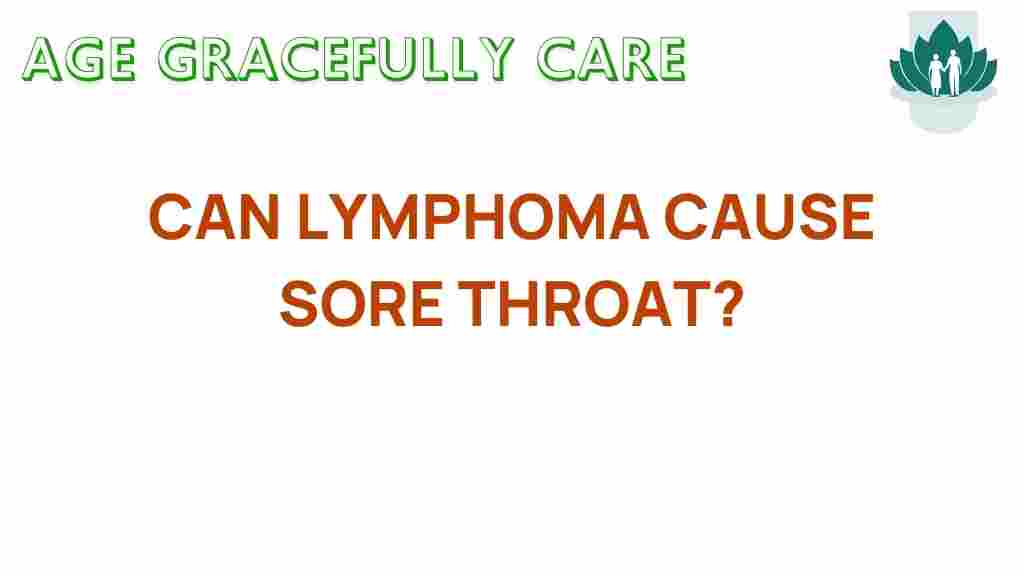Unraveling the Link: Can Lymphoma Cause a Sore Throat?
Lymphoma is a type of cancer that originates in the lymphatic system, which plays a crucial role in our immune system. Many people are unaware that lymphoma can manifest through various symptoms, including a sore throat. Understanding the connection between lymphoma and throat pain is essential for health awareness and early diagnosis. In this article, we will explore how lymphoma can cause a sore throat, the symptoms associated with this condition, and the importance of patient education in recognizing potential cancer symptoms.
Understanding Lymphoma
Lymphoma is categorized into two main types: Hodgkin lymphoma and non-Hodgkin lymphoma. Both types can affect the lymphatic system, leading to symptoms that may be mistaken for less severe health issues. Here’s a brief overview:
- Hodgkin Lymphoma: Characterized by the presence of Reed-Sternberg cells, this type often presents with swollen lymph nodes, fever, and night sweats.
- Non-Hodgkin Lymphoma: This more common form of lymphoma encompasses a diverse group of blood cancers that affect the lymphatic system. Symptoms can vary widely based on the specific subtype.
Both types can lead to various symptoms, including fatigue, unexplained weight loss, and, notably, throat pain.
How Can Lymphoma Cause a Sore Throat?
The link between lymphoma and a sore throat is primarily due to the involvement of the lymphatic system and the immune response. When lymphoma affects lymph nodes in the neck or throat area, it can cause inflammation and discomfort. Here are some ways lymphoma can lead to throat pain:
- Swollen Lymph Nodes: Enlarged lymph nodes can press against surrounding tissues, leading to discomfort or pain in the throat.
- Infection: Patients with lymphoma may experience a weakened immune system, making them more susceptible to infections that can cause sore throat.
- Localized Symptoms: Some forms of lymphoma may directly involve the throat or adjacent areas, causing localized pain.
Common Symptoms of Lymphoma
Recognizing the symptoms of lymphoma is vital for early diagnosis. Besides a sore throat, other common cancer symptoms include:
- Fatigue and weakness
- Unexplained fever
- Night sweats
- Loss of appetite or weight loss
- Persistent cough or shortness of breath
- Itching or rash
If you experience a sore throat along with these symptoms, it is crucial to consult a healthcare professional for a thorough evaluation.
Diagnosis of Lymphoma
Diagnosing lymphoma involves a multi-step process. Here’s a general outline of what to expect:
- Medical History Review: Your doctor will ask about your symptoms, medical history, and any relevant risk factors.
- Physical Examination: A thorough examination will check for swollen lymph nodes or other signs of lymphoma.
- Imaging Tests: Tests such as CT scans or PET scans help visualize the lymphatic system and detect abnormal growths.
- Biopsy: A definitive diagnosis often requires a biopsy, where tissue from a swollen lymph node is examined for cancerous cells.
The importance of early diagnosis cannot be overstated, as treatment options are more effective in the initial stages of lymphoma.
Patient Education: Recognizing Symptoms
Health awareness and patient education play vital roles in early detection and treatment of lymphoma. Here are some key points to consider:
- Know the Signs: Be aware of the symptoms associated with lymphoma and seek medical attention if you experience them.
- Monitor Changes: Keep track of any new or unusual symptoms, especially if they persist over time.
- Communicate with Healthcare Providers: Always discuss your symptoms openly with your doctor, and do not hesitate to ask questions about your health.
For more information on cancer symptoms and health awareness, consider visiting Cancer.org.
Troubleshooting Tips for Managing Throat Pain
If you are experiencing a sore throat, here are some tips to help manage the pain while you seek medical advice:
- Stay Hydrated: Drink plenty of fluids to keep your throat moist and alleviate discomfort.
- Gargle Salt Water: Gargling with warm salt water can reduce inflammation and soothe throat pain.
- Use Lozenges: Throat lozenges can provide temporary relief from soreness.
- Rest Your Voice: Try to rest your voice and avoid straining your throat.
- Avoid Irritants: Stay away from smoke, strong odors, and other irritants that can worsen throat pain.
Conclusion
In conclusion, lymphoma can indeed cause a sore throat, and understanding this link is crucial for health awareness. Recognizing the symptoms associated with lymphoma, such as throat pain, can lead to early diagnosis and treatment. Patient education plays a significant role in empowering individuals to take charge of their health. If you experience a persistent sore throat along with other symptoms such as fatigue, fever, or night sweats, consult a healthcare professional for a thorough evaluation.
Remember, staying informed about cancer symptoms and maintaining a proactive approach to your health can make a significant difference in outcomes. Your immune system’s health is paramount, and being vigilant is key to addressing any concerns that may arise.
For additional insights into cancer and its symptoms, visit MedlinePlus.gov.
This article is in the category Health and created by AgeGracefullyCare Team
